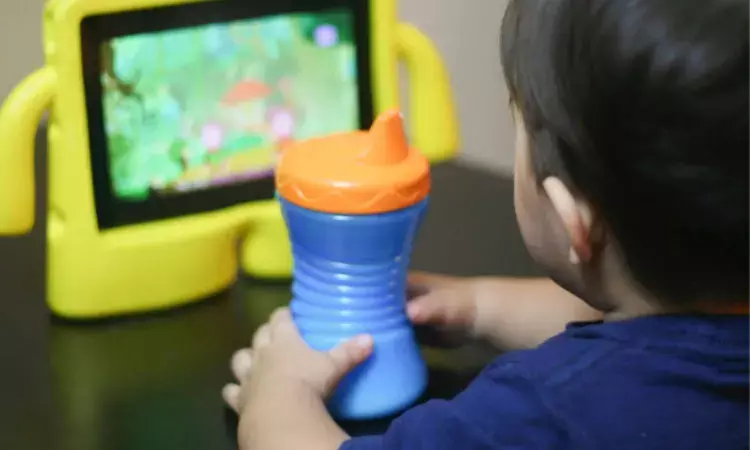- Home
- Medical news & Guidelines
- Anesthesiology
- Cardiology and CTVS
- Critical Care
- Dentistry
- Dermatology
- Diabetes and Endocrinology
- ENT
- Gastroenterology
- Medicine
- Nephrology
- Neurology
- Obstretics-Gynaecology
- Oncology
- Ophthalmology
- Orthopaedics
- Pediatrics-Neonatology
- Psychiatry
- Pulmonology
- Radiology
- Surgery
- Urology
- Laboratory Medicine
- Diet
- Nursing
- Paramedical
- Physiotherapy
- Health news
- Fact Check
- Bone Health Fact Check
- Brain Health Fact Check
- Cancer Related Fact Check
- Child Care Fact Check
- Dental and oral health fact check
- Diabetes and metabolic health fact check
- Diet and Nutrition Fact Check
- Eye and ENT Care Fact Check
- Fitness fact check
- Gut health fact check
- Heart health fact check
- Kidney health fact check
- Medical education fact check
- Men's health fact check
- Respiratory fact check
- Skin and hair care fact check
- Vaccine and Immunization fact check
- Women's health fact check
- AYUSH
- State News
- Andaman and Nicobar Islands
- Andhra Pradesh
- Arunachal Pradesh
- Assam
- Bihar
- Chandigarh
- Chattisgarh
- Dadra and Nagar Haveli
- Daman and Diu
- Delhi
- Goa
- Gujarat
- Haryana
- Himachal Pradesh
- Jammu & Kashmir
- Jharkhand
- Karnataka
- Kerala
- Ladakh
- Lakshadweep
- Madhya Pradesh
- Maharashtra
- Manipur
- Meghalaya
- Mizoram
- Nagaland
- Odisha
- Puducherry
- Punjab
- Rajasthan
- Sikkim
- Tamil Nadu
- Telangana
- Tripura
- Uttar Pradesh
- Uttrakhand
- West Bengal
- Medical Education
- Industry
Screen time linked to new onset obsessive-compulsive disorder among adolescents

UC San Francisco researchers have found in a new national study that among preteens, the odds of developing OCD over a two-year period increased by 15% for every hour they played video games and by 11% for every hour they watched videos.
The study has been published in the Journal of Adolescent Health.
"Children who spend excessive time playing video games report feeling the need to play more and more and being unable to stop despite trying," said Jason Nagata, MD, lead author of the study and assistant professor of pediatrics at UCSF. "Intrusive thoughts about video game content could develop into obsessions or compulsions."
Watching videos, too, can allow for compulsive viewing of similar content-and algorithms and advertisements can exacerbate that behavior, he added.
OCD is a mental health condition involving recurrent and unwanted thoughts as well as repetitive behaviors that a person feels driven to perform. These intrusive thoughts and behaviors can become severely disabling for the sufferers and those close to them.
"Screen addictions are associated with compulsivity and loss of behavioral control, which are core symptoms of OCD," Nagata said.
Create a Family Media Plan
Researchers asked 9,204 preteens ages 9-10 years how much time they spent on different types of platforms; the average was 3.9 hours per day. Two years later, the researchers asked their caregivers about OCD symptoms and diagnoses. Use of screens for educational purposes was excluded.
At the two-year mark, 4.4% of preteens had developed new-onset OCD. Video games and streaming videos were each connected to higher risk of developing OCD. Texting, video chat and social media didn't link individually with OCD, but that may be because the preteens in the sample didn't use them much, researchers said. Results may differ for older teens, they added.
In July, Nagata and his colleagues discovered excessive screen time was linked to disruptive behavior disorders in 9-11 year olds, though social media was the biggest contributor in that case. In 2021, they found adolescent screen time had doubled during the pandemic.
"Although screen time can have important benefits such as education and increased socialization, parents should be aware of the potential risks, especially to mental health," said Nagata. "Families can develop a media use plan which could include screen-free times including before bedtime."
Reference:
Jason M. Nagata, Jonathan Chu, Gabriel Zamora, Kyle T. Ganson, Alexander Testa, Dylan B. Jackson, Caitlin R. Costello, Stuart B. Murray, D.Clin.Psych., Fiona C. Baker, Published:December 12, 2022 DOI: https://doi.org/10.1016/j.jadohealth.2022.10.023
Dr Kamal Kant Kohli-MBBS, DTCD- a chest specialist with more than 30 years of practice and a flair for writing clinical articles, Dr Kamal Kant Kohli joined Medical Dialogues as a Chief Editor of Medical News. Besides writing articles, as an editor, he proofreads and verifies all the medical content published on Medical Dialogues including those coming from journals, studies,medical conferences,guidelines etc. Email: drkohli@medicaldialogues.in. Contact no. 011-43720751


